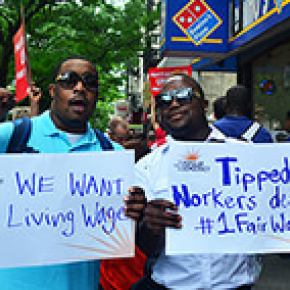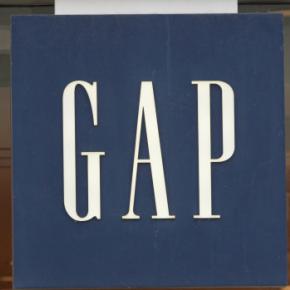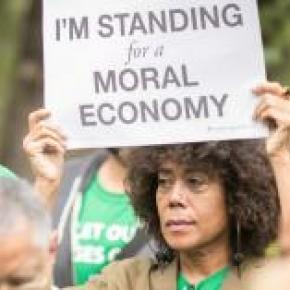Woman Who Confronted Jeff Flake in the Elevator: 'I Wanted Him to Feel My Rage'

Woman Who Confronted Jeff Flake in the Elevator: 'I Wanted Him to Feel My Rage'
The protesters who cornered Flake just before he voted on Kavanaugh's confirmation spoke out about why they did it.
...
The protesters who cornered Flake just before he voted on Kavanaugh's confirmation spoke out about why they did it.
Read the full article here.
Tipped Workers Fight for Higher Wages
Amsterdam News - July 17, 2014, by Stephon Johnson - Last week, a new coalition of food delivery workers, low-wage tipped workers and women’s rights leaders across New York called for an end to...
Amsterdam News - July 17, 2014, by Stephon Johnson - Last week, a new coalition of food delivery workers, low-wage tipped workers and women’s rights leaders across New York called for an end to subminimum wages for tipped workers. This campaign begins right when Gov. Andrew Cuomo’s administration is preparing to appoint a Wage Board charged with recommending an increase in the minimum wage for tipped workers.
The broad coalition fighting for subminimum wage workers includes Make the Road New York, the Center for Popular Democracy, Fast Food Forward, the Labor-Religion Coalition, the National Employment Law Project, New York Communities for Change, the Restaurant Opportunities Center of New York, Restaurant Opportunities Centers United, Strong for All, United New York and other community groups.
On July 10, Domino’s delivery workers rallied outside of a Manhattan Domino’s restaurant to call for an end to subminimum wages for tipped workers, citing wage theft, and demanding an administrative wage order that requires companies to directly pay tipped workers the state’s minimum wage, with tips as an addition.
“The public might think we do well, but the reality is that many times we don’t even get a tip,” said Alfredo Franco, a tipped Domino’s delivery worker in New York City. “Delivery fees are often confused with a tip for the drivers. We never see a penny of that. Many of us have to work two or three jobs just to get by, sacrificing everything, including time with our families. We need a reliable income. The tipped [sub]minimum wage has to go.”
According to a report released on July 9 by the National Employment Law Project, a wage order eliminating the tipped subminimum wage would benefit close to 229,000 low-wage tipped workers in New York. Women make up more than 70 percent of the low-wage work force. The wage order would benefit working women and, according to the report, make progress in addressing the gender pay gap in New York.
Michael Stewart, executive director of United NY, released a statement championing the NELP’s report. “As New York faces one of the worst economic inequality crises in the nation, it should put an end to the subminimum wage for tipped workers that leaves so many of our neighbors living in extreme poverty,” said Stewart. “The minimum wage is already too low. Allowing employers to pay below it does further damage to workers and our economy.”
As a result of legislation signed by Cuomo last year, New York’s minimum wage is scheduled to go up to $9 an hour by Dec. 31, 2015, and the minimum wage for tipped food service workers is still stuck at $5 an hour, with tipped hotel workers earning slightly more at $5.65 an hour.
Zenaida Mendez, president of the National Organization for Women of New York State, said the gender pay gap needs to close, and no longer allowing the subminimum wage for tipped workers would help it along.
“The poverty rate for waitresses is three times the rate for the American workforce as a whole,” said Mendez. “For this reason, the National Organization for Women is seeking to eliminate the subminimum wage for tipped workers. This pay inequality must end.”
Source
Companies End On-Call Scheduling After NY Attorney General’s Letter
Gap Inc. is the latest retailer to end its practice of requiring workers to remain on-call for short-notice shifts following an inquiry from New York’s attorney general.
A spokeswoman for...
Gap Inc. is the latest retailer to end its practice of requiring workers to remain on-call for short-notice shifts following an inquiry from New York’s attorney general.
A spokeswoman for the San Francisco-based retailer says the decision also applies to Gap’s other brands, including Banana Republic, Old Navy and Athleta and was part of an effort to “improve scheduling stability and flexibility” for workers.
Spokeswoman Laura Wilkinson says the change will apply “across our global organization” and that the company is working to establish scheduling systems giving store employees at least 10 to 14 days’ notice.
Attorney General Eric Schneiderman’s office sent letters to Gap and 12 other retailers earlier this year questioning them about on-call scheduling, which required hourly workers to stay on-call for shifts set the night before or the same day, giving them little time to arrange for child care or work other jobs.
“Workers deserve stable and reliable work schedules, and I commend Gap for taking an important step to make their employees’ schedules fairer and more predictable,” said Schneiderman, a Democrat.
Abercrombie & Fitch and Victoria’s Secret also ended the practice this summer.
Carrie Gleason, director of the Fair Workweek Initiative at the Center for Popular Democracy, said in a statement that Gap’s decision reflects not only Schneiderman’s concerns but also a new ordinance in San Francisco requiring chain retailers to set schedules in advance. Similar proposals are pending before other city governments.
“Working people in hourly jobs are starting to speak out about the impact that employers’ scheduling practices has on their lives,” Gleason said in a statement.
Source: CBS DC
Building a National People’s Movement
Over the past year, millions of workers have earned a raise as a result of the growing boldness of workers and organizers across the country. The success of the Fight for 15 and similar movements...
Over the past year, millions of workers have earned a raise as a result of the growing boldness of workers and organizers across the country. The success of the Fight for 15 and similar movements is no accident. Rather, it is the product of years of experimentation, perseverance, and creativity—and today, organizers may have finally hit on a powerful formula for helping workers take back some measure of power.
This success stems first and foremost from a basic reality: The economy in its current state is just not working for Americans. Nearly a decade after the 2008 recession, millions of families around the country have yet to be even touched by the recovery. Wages have stayed flat even as worker productivity has soared. Too many are stuck in jobs that don’t pay the bills, working hard and failing to even stay afloat.
Moreover, it has become increasingly clear that their suffering is by design, not a product of simple economics. The bad behavior of major corporations has been a driving force. Walmart and McDonald’s have come under fire for paying workers wages that force them onto public assistance to cover their basic needs. Pharmacy chains like Walgreens “promote” workers to salaried positions that require more hours without the chance at overtime pay. And countless businesses, from pizza chains to car washes, rob workers of an honest day’s pay through different forms of wage theft.
This atmosphere is ripe for the emergence of policies that give workers the pay they deserve. Getting these policies in place, however, requires a fight.
For years, community and labor organizations around the country supported workers by helping them organize themselves, going store by store, employer by employer. More recently, though, organizations such as Make the Road New York, Working Washington, New York Communities for Change, and others have begun to target entire industries—and, in turn, the economy as a whole. Pinning the blame on bad practices that are common to all companies—rather than one individual employer—allowed them to make the case that the problem demanded a widespread response.
Moreover, the demands have grown bigger, escalating from modest increases in the minimum wage to $8.75 to a more ambitious $10.10 and then all the way to $15. And while minimum-wage fights were traditionally separate from those for paid sick days, many organizers realized linking the two made for a far more powerful and galvanizing campaigns. The more ambitious our demands became, the more effective we have become, demonstrating the political salience of transformative demands.
Finally, more money for robust field campaigns was a critical part of the solution. Unions like the Service Employees International Union made a strategic decision to invest big in campaigns that would lift up the needs of all workers—including those who weren’t part of their union, a fundamentally new approach to organizing. As momentum grew, other unions and foundations have joined the cause, recognizing that helping working women and men to stand up for themselves and their families helps the whole economy. This funding has enabled organizations to launch bigger, more ambitious campaigns and to have the firepower needed to win them.
The results have been nothing short of extraordinary. Just a few years ago, when fast-food workers first went on strike in New York City, a $15 wage was unimaginable. This year, it became a reality in two of the largest states in the country—New York and California—affecting nearly nine million workers. Nearly 30 states have taken action to lift their minimum wage above the federal threshold of $7.25—and almost ten have done so for tipped workers. Ten states and more than a dozen cities have passed paid sick days for workers.
In the coming year, more than a dozen states and cities ranging from Wisconsin to Pennsylvania will be seeking a raise for their residents, reaching as high as $15 in many places. And, with half the country concentrated in America’s top 35 metro areas, the impact of these local laws has been disproportionate.
Today, organizers around the country are setting their sights on bigger goals, applying the lessons learned from the push for higher wages. We will be working to improve access to affordable housing, enact fair scheduling reforms that protect workers from unpredictable hours, and reduce the parasitic power and tax avoidance of hedge funds and other major corporations.
Yet individual victories are not enough. To truly convert this energy into lasting change, we will need a unified, nationwide movement that situates economic justice as just one part of a broader agenda of opportunity. And we will need this movement to be rooted in resilient, democratic people’s organizations on the front lines, all across the country.
This weekend, the Center for Popular Democracy is convening a People’s Convention that will bring together thousands of organizers from community groups across the country. The weekend will provide an opportunity to share lessons learned, to strategize together and to harness the energy of the past year into a powerful organized movement for progressive change through the next decade.
By providing the space for community leaders and organizers to begin working as one, we will begin to shift the balance of power back to working families and ensure the voices calling out for a future with dignity and justice will not fade out.
By Andrew Friedman
Source
Advocacy group calls for more oversight of California charter school spending

Advocacy group calls for more oversight of California charter school spending
A lack of transparency and inadequate oversight can set up the potential for waste, fraud, and abuse. A 2015 report from the Alliance to Reclaim Our Schools and the Center for Popular Democracy...
A lack of transparency and inadequate oversight can set up the potential for waste, fraud, and abuse. A 2015 report from the Alliance to Reclaim Our Schools and the Center for Popular Democracy, entitled “The Tip of the Iceberg,” reported over $200 million lost to fraud, corruption and mismanagement in charter schools.
Read the full article here.
Democracy for America Holds Solidarity Rallies Across the Nation

Democracy for America Holds Solidarity Rallies Across the Nation
Democracy for America (DFA) members joined Americans across the country to stand against white supremacy and against the deadly violence committed by Nazi groups in Charlottesville.
...
Democracy for America (DFA) members joined Americans across the country to stand against white supremacy and against the deadly violence committed by Nazi groups in Charlottesville.
Read the full article here.
How cities are bypassing states to explore registering hundreds of thousands to vote

How cities are bypassing states to explore registering hundreds of thousands to vote
National groups, in search of voting rights laws that could be pursued in Republican-controlled states, have taken notice of the potential for city-by-city reforms. The Center for Popular...
National groups, in search of voting rights laws that could be pursued in Republican-controlled states, have taken notice of the potential for city-by-city reforms. The Center for Popular Democracy, a national progressive group connected to advocacy organizations in 38 states, issued a report Friday geared toward educating potential partners on what voting reforms cities can pursue.
Read the full article here.
Fed Up With Being Shut Out of Federal Reserve, Activists Descend on Summit
Specifically, the coalition is warning against the very real prospect of higher interest rates, saying a rate hike would slow the economy and harm those for whom the so-called "recovery" has been...
Specifically, the coalition is warning against the very real prospect of higher interest rates, saying a rate hike would slow the economy and harm those for whom the so-called "recovery" has been weakest, including poor people, women, and communities of color.Instead, the coalition is calling on the Fed to ditch those plans and give vulnerable communities, including "tens of millions of Black Americans who are still struggling," a say in economic policy.
Fed officials have for months signaled an intent to raise short-term interest rates—which were slashed to zero in 2008 in an effort to spur spending and investment—as soon as this fall or winter. As the Washington Post reported Thursday, reported wage growth "combined with the strong hiring and a rapidly falling unemployment rate, gave the Fed hope that the economy would be able to withstand the first rate hike in nearly a decade by the end of the year."
But recent volatility in stock markets in the U.S. and globally, as well as internal policy disagreements, are leading some economic observers to predict that the Fed may now beless likely to set a rate hike at its September meeting.
Regardless, the Fed Up campaign—anchored at the Center for Popular Democracy and supported by 25 groups including the Economic Policy Institute, Demos, and the AFL-CIO—says raising interest rates would be foolhardy.
And they're in Wyoming to make that view known. According to the Huffington Post, "Fed Up's member organizations brought over 100 primarily low-income grassroots activists from across the country for the gathering. It's a dramatic increase from its inaugural visit to Jackson Hole last year, when the campaign brought a group of 10 activists."
As Sam Ross-Brown wrote at the American Prospect this month, "Fed Up's goal is a more 'pro-worker' Federal Reserve, and their first step is stopping the Fed from hiking interest rates before wages and employment have a chance to catch up with the recovery. Building on a similar action last year, the coalition began circulating a petition this week demanding the Fed keep rates low until wages and employment rise."
"There is no data supporting the Fed's push for higher interest rates," said Ady Barkan, campaign director for Fed Up. "While they toy with halting the recovery, there is a crisis of stagnant wages and a lack of good jobs."
According to Whose Recovery? A National Convening on Inequality, Race, and the Federal Reserve—the Fed Up Coalition's policy agenda for three days of teach-ins and workshops in Jackson Hole—a rate hike would slow down the economy so that there are fewer new jobs and workers have less power to negotiate raises.
"By raising interest rates, the Federal Reserve will make it more expensive for us to pay our credit card, student loan, car, and mortgage payments," the Fed Up campaign says. "That means we will have less money in our pockets to buy the goods and services we need. And that will have a terrible ripple effect throughout the economy: businesses will earn less revenue, so they will lay off workers (or avoid hiring new workers) and they won’t be able or willing to give workers any raises. With bad job prospects and stagnant wages, working families won’t earn enough to buy the goods and services they need, which starts the whole cycle again."
"If this sounds like a terrible idea," the coalition continues, "that's because it is."
The Fed Up perspective is supported by economist Joseph Stiglitz, who spoke alongside the grassroots activists at an event on Thursday. The same day, Stiglitz wrote in an LA Timesop-ed:
It is hard to see why the Fed would choose slower job and wage growth for most Americans just to protect against the theoretical risk of moderately higher inflation. But, then again, it's often hard to understand the Fed's policy choices, which tend to contribute to widening inequality in the United States.
Too often, after the end of one recession, the Fed, fearing inflation, has used monetary policy to dampen the economic expansion. Its maneuvers keep inflation low but unemployment higher than it otherwise would be, negatively affecting all workers, not just those out of a job. Workers in jobs face greater stresses, downward pressure on wages and diminished opportunities for upward career mobility. The costs of higher unemployment are borne disproportionately by people in lower-income jobs, who also tend to be disproportionately people of color and women.
Beyond the particulars of interest rates and inflation, however, the Fed Up Coalition iscalling for the central bank to facilitate more robust public engagement and greater transparency, given its position as "arguably the nation's most powerful economic actor."
"For far too long, our communities have been isolated from the Federal Reserve’s policy choices," the coalition writes in Whose Recovery? "Monetary policy has been left up to the bankers and the economists, with the public largely shut out and confounded by its seeming complexity."
Unsurprisingly, the document continues, "[t]he consequences of this disengagement have been profound. For the past 45 years, with only a few exceptions, the Federal Reserve has set policy that benefits banks and harms borrowers, helps employers and hurts workers, and privileges the voices and needs of corporate elites rather than those of America's working families."
Source: CommonDreams
Stitched with Prejudice: Zara USA’s Corporate Culture of Favoritism
This paper reports the findings of our original survey aimed at understanding whether retail workers’ experiences of their opportunities at New York City Zara stores was different based on skin...
This paper reports the findings of our original survey aimed at understanding whether retail workers’ experiences of their opportunities at New York City Zara stores was different based on skin color or race. Zara, the world’s largest fashion retailer, has faced several complaints about racially insensitive designs over the years.This report finds that employees of color in Zara’s New York City stores face unequal conditions within the company:
Black employees are more than twice as dissatisfied with their hours as white employees. Darker-skinned employees report that they are least likely to be promoted. Employees of color state that they are reviewed with harsher scrutiny from management than white American and European employees. Of workers in the lower prestige back-of-store roles, 68 percent have darker skin.While Zara employees report experiencing discrimination in the workplace, they have also witnesseddiscriminatory practices against Zara customers of color.
According to surveys across Zara’s New York City workforce, Black customers are 7 times more likely to be targeted as potential thieves than white customers.In order to address problems of discrimination, this report recommends that Zara recommits itself to non-discrimination in employment, promotion, and service in New York City.
We recommend the following steps:
Institute a practice for workers to have access to a neutral, third-party arbiter to address their grievances, particularly relative to color and race discrimination. Recognize and respect workers’ basic labor rights, including regular and reliable schedules regardless of race, equal opportunity to be promoted, and a living wage. Allow New York City Zara employees to choose to represent themselves in grievances through real bargaining agents, such as labor unions, without interference.Down the full report here:
'Nueva York en un Minuto': el fiscal general Jeff Sessions le declara la guerra a la pandilla MS-13

'Nueva York en un Minuto': el fiscal general Jeff Sessions le declara la guerra a la pandilla MS-13
En otras noticias, la dueña de una floristería de Nueva Jersey es acusada de robar flores de un cementerio y el expresidente dominicano Leonel Fernández está en Manhattan para presentar su nuevo...
En otras noticias, la dueña de una floristería de Nueva Jersey es acusada de robar flores de un cementerio y el expresidente dominicano Leonel Fernández está en Manhattan para presentar su nuevo libro.
Lea el artículo completo aquí.











2 months ago
2 months ago